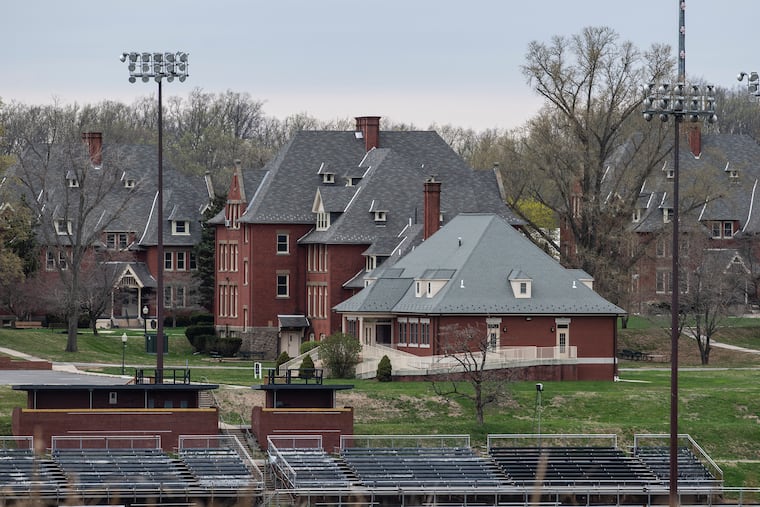Amid abuse probe, Glen Mills Schools appeals license revocation by state DHS
Leaders at the oldest U.S. reform school deny abusing children and argue that too many inspectors have toured the Delaware County campus for a cover-up to have taken place.

Last week, the Pennsylvania agency that oversees the Glen Mills Schools pulled its licenses, closing the nation’s oldest existing reform school amid findings of child abuse and cover-ups by staff and school leaders.
On Tuesday, Glen Mills filed an appeal of the revocations by the Pennsylvania Department of Human Services (DHS) in a bid to keep open the nearly 200-year-old school for court-ordered boys.
In its petition — a copy of the document submitted April 4 to the state appealing an emergency removal order for all boys on campus — Glen Mills leaders again argued that its staff never abused children, and that the school has been scrutinized by too many inspectors to have hidden such violence.
“Glen Mills has offered its students a once-in-a-lifetime opportunity: to get an excellent education and learn to live in society without resorting to violence or delinquency,” the appeal states. “On a campus that was green and rich with opportunity, Glen Mills has offered its students a path to a future filled with promise and success.”
A recent Inquirer investigation exposed how for decades, Glen Mills staff routinely and severely beat the boys in their care, then kept them from reporting their abuse by monitoring their phone calls, restricting their family visits, and threatening them with longer sentences. One boy was knocked unconscious for mouthing off. For making a crude joke, another teen had his face stepped on by counselors, breaking his jaw.
DHS also investigated Glen Mills and corroborated the newspaper’s findings. A few weeks after the Inquirer report was published, the state issued an emergency removal order, evacuating the boys remaining at the Delaware County campus. The state notified Glen Mills it was pulling the school’s licenses on April 8.
In the appeal, Glen Mills argues that too many people — from state and city officials to lawyers, clergy, and psychiatrists — visited the school over the years for violence and intimidation to have gone unnoticed.
“To believe that foundation exists would be to accept that all of the following people who actually visited, toured, and inspected the campus were completely and utterly duped into believing that it was a safe place," the school’s attorneys argued.
Ali Fogarty, a spokesperson for DHS said, “We stand by our decision to revoke the license for the reasons stated in the notice of revocation and are prepared to defend the action in the school’s appeal.”
As noted in the Inquirer investigation, at least 13 Glen Mills staffers over the last five years have been fired, and dozens more have been retrained or reprimanded over assaults on 15 students at the school, according to DHS inspection reports.
Part of the reason DHS decided to close Glen Mills was the school’s failure to fix these problems cited over the years, Deputy Secretary Cathy Utz told The Inquirer last week. “We started to look at trends in the incidents that had been brought to our attention," she said. The problems she saw "continued to surface ever after plans of correction.”
In fact, DHS leaders are facing scrutiny for not acting sooner in a class-action lawsuit filed last week by the Juvenile Law Center, Education Law Center PA, and law firm Dechert LLP. In light of the incidents flagged over the years, the complaint accuses Utz, along with Secretary Teresa Miller and former Secretary Theodore Dallas, of “callous disregard for the safety and well-being” of boys at Glen Mills.
“The failure of officials at PA-DHS to provide sufficient oversight of Glen Mills and their continued licensing of the facility despite Glen Mills’ continued violations of the minimum standards of [state regulations] placed plaintiffs and all class members perpetually in harm’s way,” the complaint reads.
But it’s likely the incidents found by the state comprise a fraction of the systemic violence at Glen Mills, where boys said staff members hid them until their bruises disappeared, or told them to lie and say their injuries came from playing sports.
Last summer, after two counselors brutally attacked a Philadelphia teenager — identified by his initials, A.W. — staff told him not to report the abuse, saying he would end up at a less desirable placement than Glen Mills. One supervisor “even told me that it would be worse because the food wouldn’t be as good,” A.W. told The Inquirer.
Glen Mills is under investigation by the state inspector general and the Pennsylvania auditor general, as well as the Delaware County district attorney, who arrested two former Glen Mills staff members in connection with the assault on A.W.
The school is also facing a second lawsuit from local civil-rights attorney David Rudovsky, in partnership with Berger Montague, a national class-action law firm based in Philadelphia. In both complaints, multiple former students accuse their former counselors of beating and threatening them. Marsha Levick, chief legal officer for Juvenile Law Center, said she expects the suits to join.
Glen Mills held 14 licenses with the state for its various school buildings; all have been revoked and are included in Glen Mills’ appeal. DHS’s Office of Children, Youth and Families will forward the appeal to its Bureau of Hearings and Appeals, which schedules a pre-hearing conference to hash out schedules and other logistics within 30 days.
The appeal hearing is typically scheduled for four to six weeks from this meeting, Fogarty said. The department “bears the burden of proof with regards to licensing actions and allegations.” Both DHS and Glen Mills then have 30 days to file post-hearing briefs. There is no time limit on how long the hearings bureau can take to reach its decision.
DHS officials said they were not aware of a Pennsylvania juvenile facility that had successfully appealed its license revocation.